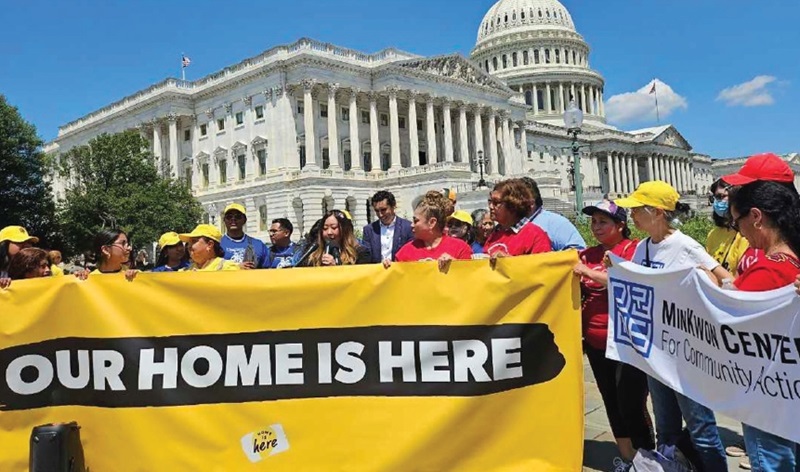President-elect Donald Trump has reignited fears among undocumented immigrants with his reaffirmation of hardline immigration policies.
Through his social media platform, Truth Social, Trump recently endorsed a post by Judicial Watch President Tom Fitton that outlined plans to declare a national emergency to execute a large-scale deportation operation using military resources. Trump’s emphatic response—“TRUE!!!”—left little doubt about his commitment to such controversial measures.
During his campaign, Trump vowed to begin mass deportations on his first day in office, declaring he would temporarily adopt “dictatorial powers” to achieve his goals. To underscore this intent, he has already named former acting Immigration and Customs Enforcement Director Tom Homan as his “border czar” to oversee these efforts.
While Trump’s rhetoric has largely targeted other immigrant groups, the Korean-American community is increasingly uneasy. Most undocumented Koreans entered the U.S. legally on visas but overstayed their permitted duration.

Despite this distinction, they recognize that no one is immune to sweeping immigration enforcement. Rumors that Chinese undocumented immigrants could be prioritized for deportation have heightened fears of broader crackdowns on Asian communities.
Advocacy organizations such as the Korean Resource Center have reported a sharp increase in inquiries from undocumented immigrants seeking advice. These include individuals who have already received deportation orders but remain in the United States. Many fear an unprecedented escalation in enforcement, such as federal agents showing up at their homes—a once-rare scenario.
According to the Migration Policy Institute, approximately 173,000 Korean immigrants were living in the U.S. without authorization as of 2019. Many undocumented Koreans are particularly worried about workplace raids targeting restaurants, hotels, construction sites, and farms—industries that frequently employ undocumented workers.
Young people who came to the U.S. as children with their undocumented parents are especially vulnerable. Among these young people are recipients of the Deferred Action for Childhood Arrivals (DACA) program, often referred to as “Dreamers.” Despite some cautious optimism tied to Trump’s business-oriented outlook and the economic contributions of over 500,000 DACA recipients, many are bracing for the worst.
Judy Choi from the Korean Resource Center noted a surge in inquiries about early DACA renewal applications, reflecting widespread apprehension about potential policy changes. One DACA recipient shared, “Trump’s anti-immigration stance feels harsher now compared to 2016. While mass deportations seem unrealistic, the fear of extreme measures is hard to ignore.”
Amid growing uncertainty, Korean and immigrant advocacy groups have stepped up efforts to provide resources and support. Organizations like the Korean Immigrant Rights Advocacy Group are preparing informational materials and launching hotlines to address concerns. National coalitions, including the National Korean American Service & Education Consortium, are drafting FAQs, preparing for potential DACA-related litigation, and organizing legal defense funds.
Kapsong Kim, Director of the MinKwon Center, emphasized that his organization is working closely with the Korean Consulate General to keep families informed if their loved ones are detained. “We are preparing for scenarios where undocumented Koreans may be arrested,” he said.
For many undocumented Koreans, the thought of leaving the U.S.—the only home they’ve ever known—is devastating. Young men, in particular, face additional challenges, such as mandatory military service in South Korea, further complicating their ability to return.
Despite the uncertainty, many remain hopeful that logistical and economic barriers will prevent Trump’s plans from being fully realized.
As the Trump administration prepares to take office, the Korean-American community faces an uphill battle in navigating the uncertain future of U.S. immigration policy. Advocacy groups are working tirelessly to provide support, and the resilience and unity of the community will be crucial in overcoming the challenges ahead.
By Mooyoung Lee [lee.mooyoung@koreadaily.com]

![Korean President Yoon Suk Yeol just got ousted. What’s next? President Yoon Suk Yeol attends the opening session of the Ministerial Conference of the Third Summit for Democracy in March last year. The Constitutional Court upheld the National Assembly’s impeachment of Yoon, ousting him from office on April 4. [YONHAP]](https://www.koreadailyus.com/wp-content/uploads/2025/04/0404-Yoon-100x70.jpg)
![Korean President Yoon Suk Yeol ousted from office after unanimous Constitutional Court ruling President Yoon Suk Yeol, right, delivers his closing statement at the 11th and final hearing of his impeachment trial at the Constitutional Court in Jongno District, central Seoul, on Feb. 25. [CONSTITUTIONAL COURT]](https://www.koreadailyus.com/wp-content/uploads/2025/04/0403-impeach-100x70.jpg)
![Clovine accelerates global expansion in collaboration platform market Website of Clovine, a cloud-based project management provider [Screenshot]](https://www.koreadailyus.com/wp-content/uploads/2025/04/0403-clovine-100x70.jpg)
